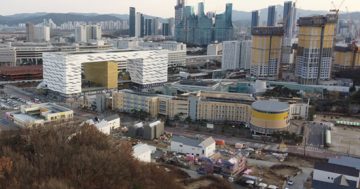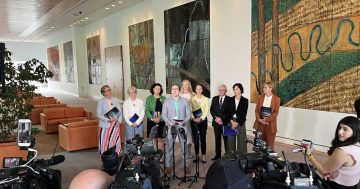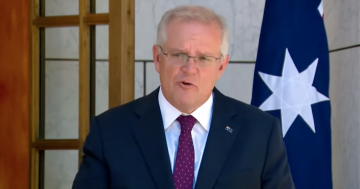The Australia and New Zealand School of Government (ANZSOG)* look at how public leaders can create a better future.
 Governments don’t only need good policies and implementation for the present, they need a sense of the broader direction that the state or nation should be taking and the imagination to understand what is possible in the future.
Governments don’t only need good policies and implementation for the present, they need a sense of the broader direction that the state or nation should be taking and the imagination to understand what is possible in the future.
Sir Geoff Mulgan CBE argues that, despite material wealth and technological progress, our political systems and societies as a whole are suffering from a collective pessimism and failure of social imagination which is leading to fatalism and reactionary politics – and preventing us from creating a better shared future.
Sir Geoff is Professor of Collective Intelligence and Social Innovation at University College London, was director of policy in the office of former UK Prime Minister Tony Blair, and an advisor to the South Australian government in 2007/08.
He will deliver an online masterclass on Social and Political Imagination as part of ANZSOG’s Public Leadership Masterclass series on 28 February.
He said that while all politicians and public sector leaders needed to deal with short-term crises and medium-term issues around implementation, they also needed to put time and energy into longer-term thinking that covered the next ten or twenty years.
“If you don’t, you are not fulfilling your responsibilities.
“Any head of department or politician or other leader has a responsibility to the future and to make decision that will look wise to your successors.
“This is important because in government, even more than in other fields, we usually overestimate what can be achieved in the short run but always underestimate what can be achieved in ten and 20 years.
“That’s when major change can be achieved so long as you have the plan, the imagination and the capacity to implement effectively.”
“One of the things that is being talked about in Europe is the scale of the transitions that we will need in the next 20 or 30 years – huge transitions to a zero-carbon economy, huge transitions still going on with an ageing population and patterns of care and design, huge transitions as we learn to deal with AI, like ChatGPT and its successors.
“What’s certain is that the current arrangements won’t work well into the future, and the question of ‘what does this mean for the next 5, 10 or 20 years?’ has to be a core responsibility of the public service.”
“This task has to be a shared one – for governments it is about mobilising every part of society, rather than sitting in small rooms in Canberra or London or Washington thinking this can be done by a few technocrats.”
Professor Mulgan said that these transitions were coming at a time when pessimism was widespread across society and our ability to collectively imagine a better future was weaker than it had been in previous decades.
“The pessimism is very clear across society.
“When surveys are done asking people if they think their kids will be worse off, the answer is yes, and that is even if they don’t accept that there will be a climate catastrophe.
“In many countries the average population has seen no rises in real income for the best part of a generation, and they have less and less confidence that the overall economic system works well for our wellbeing,” he said.
“It extends across a lot of institutions, and our culture finds it easier to think about the negatives than the positives, the media has given up on what is part of their responsibility to help society think ahead.
“When it comes to long-term issues we need to think in terms of not just avoiding catastrophe but about positives.
“A green economy is much better to live in, there is less pollution, unnecessary travel and waste.
“Ageing is not a crisis, it means we are living much longer than in the past and millions of hours are going to be liberated in the next decades from a combination of declining working hours and rising life expectancy.
“These are spaces where we need an optimism and positive imagination.
“We can look at robots and AI as an entirely negative threat, but can also see it as way of getting rid of the unpleasant things we have to do now.”
He said that many public servants they were not getting that inspiration from politicians and needed to fill that space themselves by consciously thinking about future challenges and bringing societies collective intelligence about problems together and giving it a focus.
“For example, looking back at the UK’s decarbonisation strategy and the rise of renewable energy, politicians did play a role but it was led by a network of civil servants, academics, scientists, engineers and others.
“They were looking at why we needed to take climate change seriously, what the options were, and what were the policies that came from that.
“The public service mobilised a much wider body of collective intelligence, and it was all put into a 10-20 year context of transformation, which was then turned into a set of clear signals to energy companies.”
The value of social experimentation
While many agencies changed the way they worked as a result of COVID, and got a glimpse of other possibilities, Professor Mulgan said that the COVID-19 crisis had largely been a missed opportunity to make permanent change, with governments slipping back into old habits.
“I don’t think that the crisis has been used effectively to deal with some underlying problems.
“There have been areas of positive change: more working from home and time with family; the leap in digitisation which has had lessons for education and public services; carbon emissions fell pretty sharply and we saw what a different kind of economy might look like.
“There was more attention to mental health, due to concerns about lockdown and school closures, but that meant more attention was paid to broader issues of anxiety, which were previously rather low on the agenda.
“But the default seems to be a return to previous ways of working and on top of that, because resources are so scarce due to rises in debt levels and military spending, there is less leeway to be creative and imaginative.”
He said that Australia’s stable political system and government structure gave it advantages over other countries and the federal system provided a natural laboratory for jurisdictions to learn from each other’s experiments.
“You have an advantage over the UK in that your state governments are strong and can do things differently, and can experiment and learn from each other.
“Australia has been a remarkably stable country for the last few decades and has, at least at times, an innate optimism as a newish country which lets you look to the future in ways that are slightly harder for the older European countries.
“The Australian two-party system creates stability, but also can be a blockage on creativity and imagination, which is why it’s interesting seeing the more complex political environment of the last year, because any system needs an influx of new ideas to stay creative.”
He said that governments needed to structure their work to include investment in ‘social R&D’ and small-scale experiments of new ideas.
“Most governments spend 1-2 per cent of GDP on R&D but they spend nearly all of it on hardware.
“A simple idea is to spend some of that on applying R&D methods on social policy, or classroom teaching or tackling homelessness – the kinds of experiments that you see in the sciences.
“You need to try things.
“They won’t all work but it is only by trying out a lot of things in the real world on a small scale that you get to see the next set of better ideas.”
Professor Mulgan said that the Social and Political Imagination masterclass will offer public leaders an introduction to his ideas and some practical tips and tools for incorporating imaginative thinking into their work.
“I want them to think that this work is part of their job, not a luxury add-on which you might toy with and not take seriously,” he said.
“It boils down to this sense of public services having responsibility to the future as well as the present.
“I also want them to take away a few methods that they can apply fairly quickly so it’s not an abstract concept but one that is doable.”
“In engineering, it’s taken for granted that you combine imagination with competence and efficiency.
“If you are building an incredible aeroplane or bridge or energy system it’s got to be imaginative if its going to break new ground, but it is taken for granted that implementation has to be hyper-competent and rigorous.
“Yet sometimes in the public service these are thought of as mutually exclusive – you’re either imaginative and flaky or you’re competent and efficient.
“In other fields of technology and engineering they just don’t think like that at all, they see these as absolutely interwoven and I’d prefer a public service that can think in those two dimensions the way that engineers do.”
*ANZSOG is a global leader in education and government-focused research relevant to the public sector.
This article first appeared at anzsog.edu.au.











